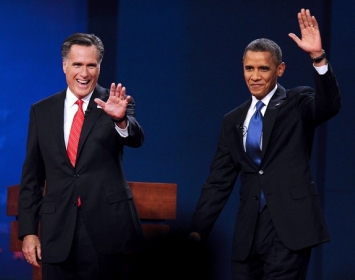Egy érdekes felmérés arról, hogy az emberek milyen szavakat néztek meg leggyakrabban a Cambridge Dictionary-ben az amerikai elnökválasztás napján. A választás szókincsét tanulhatod meg belőle.
November 8, 2016, marked the end of one of the most eventful presidential election campaigns in United States history. People across the globe watched closely as American voters turned out to cast their votes for their next president – including the millions of people who use the Cambridge Dictionary to help them understand the language used in the English-speaking media.
The Cambridge Dictionary staff tracked the words that were looked up most frequently in the 24 hours from when the polls opened the morning of November 8 until the morning of November 9. All of the words in this blog post that are linked to definitions in the dictionary were looked up with unusual frequency. The full list is at the end of this post.
With no actual results to report until the evening when the polls closed, the media focused on explaining the US electoral system and whether it could really be rigged, as the Republican Party candidate, Donald Trump, claimed. And they turned their attention to the exit polls, which revealed not only voters’ perceptions of the integrity of the candidates, but also their feelings about the election itself. Voters may have been split 50-50 in their support of Mr. Trump or of former Secretary of State Hillary Clinton, the Democratic Party candidate, but 72% of them reported feeling anxious.
As the polls began to close and the results began to be announced, users of the Cambridge Dictionary looked up phrases used to describe a race in which first one and then the other candidate seems to be winning. With the two candidates neck and neck in Florida, the race was described as a toss-up. Later on, when the results of the bellwether state Ohio came in, Democrats began to fear that they were doomed.
Meanwhile, as it became more likely that the US was on the verge of a Trump presidency, the media reported spooked financial markets and plunging stocks.
A surge in votes for Secretary Clinton as the polls in the western states closed, and late reporting from key states where the race was very tight, meant the night continued to be a nail-biter. But in the early hours of November 9, Secretary Clinton conceded the presidential race to Mr. Trump – a result that was stunning for supporters of both candidates. Democrats are reeling from the stunning defeat, and Republicans have goosebumps from the stunning triumph.
Now, the media are talking about the implications for the country.
Here is the list of words looked up most frequently in the Cambridge Dictionary, in rough order of when they were being looked up between November 8 and November 9, 2016.
electoral– relating to an election – választási, választói
precinct– a part of a city or a town in which vehicles are not allowed, used for a special purpose, such as shopping – körzet, zóna
senate– the more important of the two groups of politicians who make laws in some countries such as the US, Australia, and France – Szenátus
incumbent– officially having the named position – hivatalban lévő
poll– the place where people vote in a political election – szavazóhelyiség
to cast – to vote – szavazatot leadni
issue– a subject or problem that people are thinking and talking about – ügy, probléma
sophisticated– having a good understanding of the way people behave and/or a good knowledge of culture and fashion – kifinomult
to anticipate – to imagine or expect that something will happen – várni, hogy valami megtörténjen
to turn out – If people turn out for an event, they go to be there or to watch – részt venni
campaign– a planned group of especially political, business, or military activities that are intended to achieve a particular aim – kampány
endorsement– the act of saying that you approve of or support something or someone – jóváhagyás
to impeach – to make a formal statement saying that a public official is guilty of a serious offence in connection with their job, especially in the US – vádolni, bevádolni
to rig (an election) – to arrange dishonestly for the result of something, for example an election, to be changed – választást tisztességtelenül befolyásol
toss–up – If you describe a situation as a toss-up, you mean that either of two possibilities is equally likely – bizonytalan kimenetelű, nem tudni, ki fog győzni helyzet
appeal– a request to the public for money, information, or help – folyamodvány
to engage – to attack or begin to fight someone – harcba bocsátkozni
perception– a belief or opinion, often held by many people and based on how things seem – befolyás
prejudice– an unfair and unreasonable opinion or feeling, especially when formed without enough thought or knowledge – előítélet
concern– a worried or nervous feeling about something, or something that makes you feel worried – aggódás, aggodalom
enthusiasm– a feeling of energetic interest in a particular subject or activity and an eagerness to be involved in it – lelkesedés
pitch– a speech or act that attempts to persuade someone to buy or do something – rábeszélés
integrity– the quality of being honest and having strong moral principles that you refuse to change – integritás, tisztesség
anxious– worried and nervous – aggódó, szorongó
bellwether– someone or something that shows how a situation will develop or change – előrejelző, előrevetítő
neck and neck – If two competitors are neck and neck, they are level with each other and have an equal chance of winning. – fej-fej mellett
projected– planned for the future or calculated based on information already known – előre vetített
nail–biter – an event or film that is exciting because you do not know how it will end – rendkívül (körömrágásig) izgalmas dolog
down to the wire – until the last moment that it is possible to do something – az utolsó pillanatig
doomed– certain to fail, die, or be destroyed – pusztulásra, kudarcra ítélt
to evaluate – to judge or calculate the quality, importance, amount, or value of something – kiértékelni
severe– causing very great pain, difficulty, worry, damage, etc.; very serious – súlyos
impact– influence on something – hatás
to plunge – to (cause someone or something to) move or fall suddenly and often a long way forward, down, or into something – esni, zuhanni
to tumble – to fall quickly and without control – zuhanni
to spook – to frighten – megijeszteni
surge– a sudden and great increase – hirtelen megugrás
spectacular– especially great – látványos
on the verge of – If you are on the verge of something or come to the verge of something, you are very close to experiencing it – valaminek a határán
stunning– shocking or very impressive – lenyűgöző, letaglózó
to reel – If you reel, or your mind or brain reels, you feel very confused or shocked and unable to act – össze van zavarodva
to crush – to press something very hard so that it is broken or its shape is destroyed – összezúzni
to address – to speak to someone – beszélni valakihez, szólni hozzá, neki címezni valamit
triumph – a very great success, achievement, or victory – győzelem
concession– the act of admitting defeat – vereség beismerése
to concede – to admit, often unwillingly, that something is true – vonakodva beismerni valamit
goosebumps– small raised areas that appear on the skin because of cold, fear, or excitement – libabőr
implication– the effect that an action or decision will have on something else in the future – hatás, kihatás
bigot– a person who has strong, unreasonable beliefs and who does not like other people who have different beliefs or a different way of life – bigott
source: dictionaryblog.cambridge.org
And now that you know all the words it will be easy to understand the text above. Go back and give it a try.






